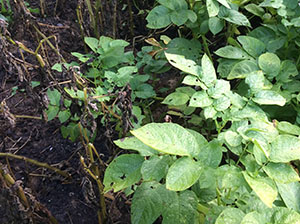
An Innovative Farmers field lab tested heritage varieties of potato and found that all varieties, including newer breeds, performed well for yield and blight resistance. A taste test also found that all tasted good when cooked as chips and mash. The Soil Association, an Innovative Farmers partner, hopes that highlighting the benefits of alternative potato varieties will help find alternative techniques to manage blight.
Ben Raskin, head of horticulture at the Soil Association said; “Late blight is likely to challenge all potato growers as conventional chemistry becomes more restricted. There are some systems and management strategies that can help, for instance agroforestry planting can slow the spread of the disease across a field, and plant tonics and stimulant can help boost the crops natural resistance. However these are limited and the reality is that most certified organic growers either top the crop (using a burner or a flail mower) when late blight arrives, or use copper to control its onset and spread.
“By raising awareness of different varieties amongst growers and consumers in this Innovative Farmers field lab we hope to find more natural answers to such a common and devastating problem as blight.”
The most dangerous current strain of blight is the 13_A2 and traditionally resistant varieties such as Cara and Lady Balfour are now no longer able to withstand the disease. Breeding by the Sarvari trust and Agrico has helped increase the number of blight resistant varieties available but not all match the appearance and taste specifications favoured by the majority of the market.
The field lab involved a small number of growers across the UK (two growers in Gloucestershire and one in Scotland) as an introductory trial. The group tested the performance of up to 11 varieties of potato against blight, and then performed a taste test to help convince consumers and retailers that different varieties can also be good to eat.
Andy Dibben of Abbey Home Farm was involved in the field lab. He said; “I have been growing blight resistant varieties for a while now and have seen categorical evidence that blight resistance can be achieved through good plant breeding. Some of the Sarpo varieties have had astounding blight resistance but have lacked a little in taste, however each time I try a new variety the taste gets better.
“Achieving great taste alongside blight resistance appears to be the real challenge for potato breeders. Field labs are a great way for farmers to find well-trialled solutions to problems that affect their production, and crucially trials often involve testing techniques rather than products.
“Lots of research and development goes into new products as they can be sold for profit, less research seems to be done on using existing products and equipment in a different way as there is no commercial incentive and because it’s harder to sell a new technique than a new product. Field labs are great way of ensuring this kind of research progresses.”
Full results are available on the Innovative Farmers website and there are plans for further trials into taste and yield at Abbey Home Farm.
Raskin continued; “There are already so many varieties of blight resistant potato out there, it seems pointless to spend so much time and money developing GM versions of the same thing. Trials like this are generally cheaper, easier to run and less exclusive. I’d encourage any grower looking for an alternative to chemical sprays to get involved in the Innovative Farmers network.”
